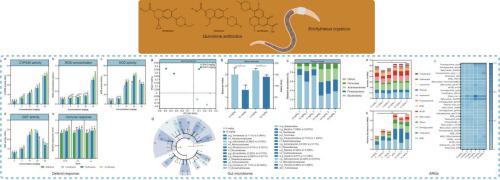Journal of Hazardous Materials ( IF 13.6 ) Pub Date : 2021-10-21 , DOI: 10.1016/j.jhazmat.2021.127509 Ming-Kang Jin 1 , Qi Zhang 2 , Wen-Lu Zhao 3 , Zhi-Heng Li 3 , Hai-Feng Qian 2 , Xiao-Ru Yang 4 , Yong-Guan Zhu 5 , Hui-Jun Liu 3

|
Antibiotic residues from animal manure cause soil pollution and can pose a threat to soil animals. In this study, the toxicological effects of fluoroquinolone antibiotics on Enchytraeus crypticus, including defence response, gut microbiome, and antibiotic resistance genes (ARGs), were studied. The cytochrome P450 enzyme activity and reactive oxygen species levels increased, activating the defense response. The superoxide dismutase and glutathione S-transferase activity, and the expression of immune defense molecules such as coelomic cytolytic factor, lysozyme, bactericidal protein fetidins and lysenin changed. Furthermore, the diversity of the gut microbiome decreased, and the relative abundance of Bacteroidetes decreased significantly at the phylum level but increased in pathogenic and antibiotic-secreting bacteria (Rhodococcus and Streptomyces) at the genus level. However, the soil microbiome was not significantly different from that of the control group. The relative abundance of ARGs in the gut and soil microbiome significantly increased with enrofloxacin concentration, and the fluoroquinolone ARGs were significantly increased in both the soil (20.85-fold, p < 0.001) and gut (11.72-fold, p < 0.001) microbiomes. Subtypes of ARGs showed a positive correlation with Rhodococcus, which might increase the risk of disease transmission and the probability of drug-resistant pathogens. Furthermore, mobile genetic elements significantly promote the spread of ARGs.
中文翻译:

氟喹诺酮类抗生素扰乱了隐囊菌的防御系统、肠道微生物组和抗生素抗性基因
动物粪便中的抗生素残留会导致土壤污染,并对土壤动物构成威胁。在本研究中,研究了氟喹诺酮类抗生素对隐孢子虫的毒理学影响,包括防御反应、肠道微生物组和抗生素抗性基因 (ARG)。细胞色素 P450 酶活性和活性氧水平增加,激活防御反应。超氧化物歧化酶和谷胱甘肽S-转移酶活性,以及体腔溶细胞因子、溶菌酶、杀菌蛋白fetidins和lysenin等免疫防御分子的表达发生变化。此外,肠道微生物组的多样性降低,拟杆菌的相对丰度在门水平上显着下降,但在属水平上致病和分泌抗生素的细菌(红球菌和链霉菌)增加。然而,土壤微生物组与对照组没有显着差异。随着恩诺沙星浓度的增加,肠道和土壤微生物组中 ARGs 的相对丰度显着增加,土壤(20.85 倍,p < 0.001)和肠道(11.72 倍,p < 0.001)微生物组中的氟喹诺酮 ARGs 显着增加。ARGs的亚型与红球菌呈正相关,这可能会增加疾病传播的风险和耐药病原体的可能性。此外,移动遗传元件显着促进了 ARGs 的传播。



























 京公网安备 11010802027423号
京公网安备 11010802027423号